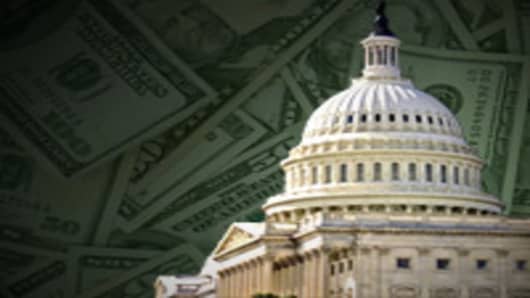The Bush tax cuts have received the most attention because they have the widest impact—affecting personal income, capital gains and dividends. But there are a whole host of other tax breaks—some adopted by President Obama—that will expire if Congress fails to break its ideological gridlock and agree on a tax plan.
Democrats and Republicans began Wednesday to work on a possible deal, but neither side for now is budging much.
"The American people did not vote for gridlock," Obama said in a press conference Tuesday. "Today we had the beginning of a new dialogue that I hope...will help break through the noise and produce real gains."
Although Obama remains opposed to the extension of lower tax rates for wealthy Americans, he has supported the extension of certain Bush-era tax proposals in his 2011 budget, which Congress has yet to approve.
Here are some of the key tax cuts set to disappear in 2011.
1. Income taxes:
A key goal of President Bush's two tax cut measures, passed in 2001 and 2003, was to cap individual income tax rates at 35 percent. In 2010, this rate applied to individuals earning more than $373,650.
Unless this provision is extended, the tax rate for the highest-earning Americans will move up to 39.6 percent next year. All lower brackets will also move to pre-Bush era levels.
This means that for middle-income Americans, for example, an individual earning roughly $80,000 a year, the tax rate will rise from 25 percent to 28 percent.
Democrats want to extend the tax breaks only to those making less than $250,000 a year, while Republicans insist that the tax cuts be extended for everyone.
2. Capital Gains and Dividends:
Another key part of the Bush tax program lowered the levy on capital gains—profits from the sale of a capital asset such as stocks or a house—to 15 percent for the highest earners. The same rate applied to dividend income. Lower-income Americans paid zero for both capital gains and dividends.
Unless the cuts are extended, capital gains taxes will rise to 18 or 20 percent for high earners and eight or ten percent for lower-income individuals.
Dividends will resume being taxed as ordinary income, as they were before the Bush years, so taxpayers will pay anywhere from 15 to 39.6 percent on dividends, depending on their annual income.
In his 2011 budget proposal, President Obama supported preserving the zero and 15 percent rates on dividends and capital gains for lower-income Americans. For married couples with income of more than $250,000 a year and individuals making more than $200,000 a year, dividends and capital gains would be taxed at 20 percent.
3. Estate Taxes:
President Bush’s 2001 tax bill set the estate tax on track to disappear in 2010—a planned holiday of sorts. This means that this year was a completely tax-free year for estates. However, the estate tax is set to make a comeback in 2011, at a rate of 55 percent, though estates valued less than $1 million will remain tax-free.
President Obama has proposed returning the estate tax to its 2009 level, at a rate of 45 percent with a tax exemption of $3.5 million. Republicans themselves remain divided on the issue, with some supporting a rate lower than 45 percent while others call for an all out repeal.
4. Paycheck Credit
Called "Making Work Pay," this credit was passed in the 2009 stimulus billto temporarily reduce the tax withheld in worker paychecks. Couples making less than $190,000 a year were eligible to receive up to $800 more in their paychecks each year; individuals making less than $95,000 were eligible for up to $400.
As a temporary measure aimed at stimulating the struggling U.S. economy, this credit is set to expire in 2011.
5. Tuition Credit
The stimulus bill also created a tax credit allowing students to deduct up to $2,500 of college-related expenses each year. This credit, a temporary replacement for the more-limited Hope Scholarship credit, was broadened to cover the first four years of college and allow costly books and other course materials to be claimed as qualifying expenses.
This program is set to expire in 2011. President Obama has supported preserving the credit as a permanent replacement for the Hope program.
5. Child Tax Credit
In 2010, parents could file for a tax credit of up to $1,000 for each child living in their home.
Next year, this credit will drop back to $500 a child. President Obama supports extending the $1,000 child tax credit in his budget proposal.
6. Mortgage Premiums
Through 2010, individuals making less than $109,000 a year—or married couples earning less than $54,500 a piece filing separately—could deduct the premiums paid each month for mortgage insurance. No more in 2011—this tax deduction expires December 31.
7. Alternative Motor Vehicles
A 2005 energy bill created a tax credit for individuals who purchased qualifying hybrid and other energy-efficient vehicles. But if you've been eyeing that Prius, you will need to act quick—this tax credit expires at the end of the year.
8. Marriage Tax
The 2003 Bush tax bill increased the standard tax deduction for married couples to $9,500 and extended their 15 percent tax rate to $56,800 of taxable income. Effectively “doubling” the figure of single tax payers, this was an attempt to reduce the “marriage penalty,” or the difference between what a couple pays and what they would have paid if they were single. This credit also expires in 2011.
Sources: The United States Treasury, the Internal Revenue Service and the Congressional Budget Office.
—Cynthia Lin contributed to this report.


